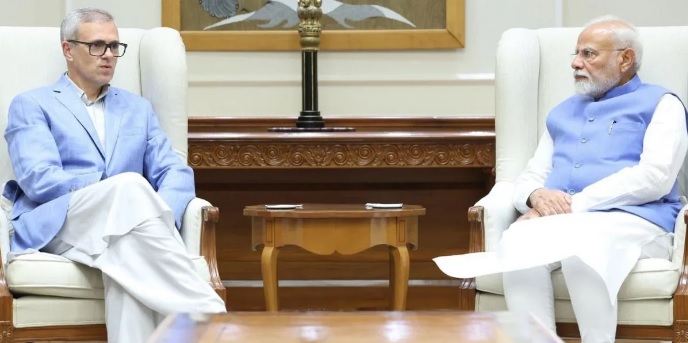Seeking Solutions: Omar Abdullah Meets PM Modi Amid Kashmir’s Post-Attack Turmoil
New Delhi 04 May 2025: In the aftermath of the devastating terror attack in Pahalgam, which claimed the lives of 26 people, predominantly tourists, Jammu and Kashmir Chief Minister Omar Abdullah held a crucial meeting with Prime Minister Narendra Modi in New Delhi. The 30-minute discussion, held at the Prime Minister’s residence, centered on the urgent need to address the security situation in the region, the profound impact of the attack on the tourism industry, and the looming concerns surrounding the upcoming Amarnath Yatra. This meeting marked the first direct interaction between the two leaders since the tragic events of April 22nd, highlighting the gravity of the situation and the imperative for swift and decisive action.
During the meeting, Chief Minister Abdullah provided Prime Minister Modi with a detailed and candid assessment of the ground situation in Jammu and Kashmir. He conveyed the palpable sense of shock and outrage that had gripped the valley in the wake of the Pahalgam attack. Notably, he emphasized the spontaneous and widespread protests that had erupted across the region, with people from all walks of life expressing their vehement disapproval of the violence. This unprecedented display of public dissent, occurring for the first time since the onset of militancy in 1989, underscored the deep-seated yearning for peace and stability among the Kashmiri populace.
Abdullah also highlighted the extraordinary act of courage displayed by Syed Adil Hussain Shah, a local pony ride operator who tragically lost his life while attempting to disarm one of the terrorists. This act of heroism, amidst the chaos and horror of the attack, served as a poignant reminder of the resilience and bravery of the Kashmiri people, even in the face of extreme adversity. Abdullah’s decision to share this story with the Prime Minister underscores the importance of acknowledging and honoring such acts of valor, which serve as beacons of hope in times of darkness.
The Shadow Over Tourism: A Vital Sector in Crisis
A significant portion of the discussion focused on the devastating impact of the Pahalgam attack on the region’s tourism industry. The tourism sector, a vital lifeline for the Kashmiri economy, has been dealt a severe blow by the recent events. The cancellation of bookings and the reluctance of tourists to visit the valley have created a climate of uncertainty and anxiety among tourism stakeholders. Abdullah conveyed the urgency of restoring confidence among potential visitors and rebuilding the industry, which is crucial for the livelihoods of countless individuals and the overall economic well-being of the region.
The timing of the attack, occurring during the peak tourist season, has amplified the economic repercussions. The loss of revenue and the potential for long-term damage to Kashmir’s reputation as a safe and desirable destination are significant concerns that require immediate and sustained attention.
Amarnath Yatra Concerns: Protecting Pilgrims in a Vulnerable Climate
The looming Amarnath Yatra, scheduled to commence on July 3rd, added another layer of complexity to the discussions. The annual pilgrimage, which attracts hundreds of thousands of devotees from across India, is a significant event for the region. However, the recent terror attack has raised serious concerns about the safety and security of the pilgrims.
The Yatra, which involves traversing challenging terrain along the traditional 48-kilometer Pahalgam route and the shorter but steeper 14-kilometer Baltal route, requires meticulous planning and robust security measures. The meeting between Abdullah and Modi addressed the need to enhance security protocols and ensure the safety of the pilgrims during this important religious event.
The potential for disruptions or attacks on the Yatra poses a significant challenge for security forces and underscores the need for close coordination between state and central agencies. The discussions likely explored strategies for enhancing surveillance, deploying additional security personnel, and implementing contingency plans to address any potential threats.
The Path Forward: Seeking Support and Rebuilding Trust
The meeting between Omar Abdullah and Narendra Modi underscored the urgent need for a coordinated and comprehensive response to the challenges facing Jammu and Kashmir. The discussions likely explored potential strategies for enhancing security, restoring confidence among tourists, and ensuring the smooth conduct of the Amarnath Yatra.
The need for sustained support from the central government, both in terms of security assistance and economic aid, is crucial for the region’s recovery. Abdullah’s meeting with Modi served as an opportunity to articulate the specific needs of the state and to seek assurances of continued support in these challenging times.
Rebuilding trust among the local population and restoring the image of Kashmir as a safe and welcoming destination will require a sustained and multifaceted approach. The discussions between the two leaders likely touched upon the importance of community engagement, promoting dialogue, and addressing the root causes of discontent.
The meeting between Omar Abdullah and Prime Minister Modi was a crucial step in addressing the complex challenges facing Jammu and Kashmir in the aftermath of the Pahalgam terror attack. The discussions underscored the urgency of restoring security, rebuilding the tourism industry, and ensuring the safety of the Amarnath Yatra. The commitment to coordinated action and sustained support from the central government will be vital for the region’s recovery and long-term stability.



